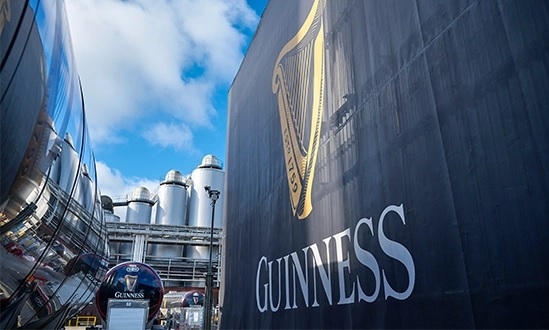Diageo to create ‘one of the most efficient breweries in the world’
Diageo will invest over €100m ($109m) to decarbonise its historic St. James’s Gate site in Dublin, where Guinness has been brewed for 264 years.
The investment will help the site move towards net zero carbon emissions and promises to improve energy and water consumption to make it ‘one of the most efficient breweries in the world’ by 2030.
The site will entirely phase out the use of fossil fuels in its direct brewing operations and reduce Scope 1+2 GHG emissions generated by the site by more than 90%, in line with the Science Based Target initiative’s definition of net zero.
By 2030, the site’s renewable energy strategy will combine the use of grid-supplied electrical power heat pumps; and biogas generated within a new water recovery facility. This facility will also improve water use efficiency and enable a projected reduction in the water used to brew Guinness by 30%.
Diageo is preparing a planning application for this decarbonisation project that will be submitted to Dublin City Council later this year.
PepsiCo’s Spanish plant to make global first for the company
In Spain, PepsiCo’s beverage plant in Northern Spain aims to become the company’s first plant globally to reach net-zero emissions by 2025.
The beverage plant, in Álava Basque Country, produces iconic brands such as Pepsi as well as local brands KAS and Bitter KAS. It is set to reach net zero emissions next year, thanks to the electrification of the plant's operations, leading to the elimination of 1,849 tonnes of CO2 per year.
The production plant has been using electricity from renewable sources since 2015 and now, thanks to a new decarbonization project, natural gas will be replaced by electric energy to reach the goal of 100% electrification of the facilities following a two-year pilot program.
In addition to the €5m ($5.4m) that was invested in the electrification project, PepsiCo allocated a further €27m ($29.3m) over the last five years for improvement projects, both in terms of innovation and sustainability. This includes new packaging equipment, closer warehousing to avoid transportation, as well as the implementation of more efficient processes.
This announcement follows the opening of PepsiCo’s most sustainable factory in Europe last year in Poland. The Środa Śląska plant uses new sustainability solutions that demonstrate aspects of a circular economy in action, such as collecting rainwater for reuse and generating its own energy via rooftop solar panels, with the plant set to be climate neutral by 2035.
Bagikan Berita Ini















0 Response to "Improving sustainability in beverage production: Diageo and PepsiCo invest in European plants - BeverageDaily.com"
Post a Comment